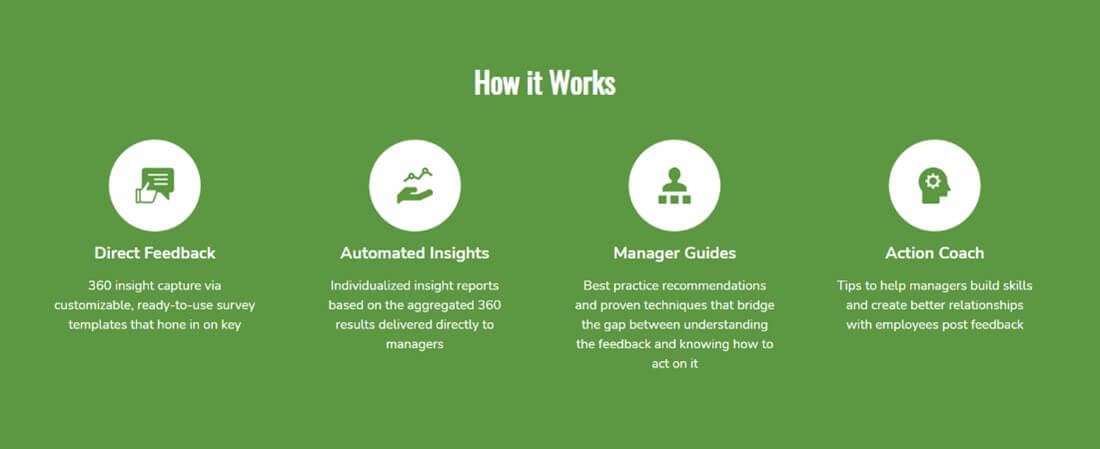Managers have a critical impact on engagement and retention in the workplace. At their best, good managers know how to support their employees and keep them engaged, while continuing to grow and improve themselves. But when they lack key skills, managers have the potential to hinder organizational performance, stunt innovation, and cause employees to quit.

Research shows that 1 in 4 employees say that a better manager is the one thing to improve the workplace.
Providing managers with timely and actionable feedback from their direct-report employees is crucial to creating an engaged workforce. These employees work with them closely on a daily basis; they know the exact areas where they excel or where they could use improvement. Managers can’t improve if they do not know what they need to work on.
By providing managers with feedback, you can:
- Help them spearhead their own professional development.
- Sharpen their skills to become more effective leaders.
- Create trust and synergy between managers and their employees.
- Develop a happier and more engaged workforce.
- Avoid costly turnover within teams.
- More easily reach business goals and internal KPI’s.
Providing managers with feedback makes sense, so why is it overlooked in so many organizations? Truth is, manager feedback can be tough to collect, and even harder to deliver in the right way—but it doesn’t have to be.
Here are a few best practices to make the process easier for everyone:
Assure responses will be kept anonymous
For any survey to be successful, it is important to assure your employees that their feedback will remain anonymous. Manager feedback surveys are extremely personal and look into many aspects of a manager’s skills. Respondents may be weary of giving their honest opinions in fear of repercussions. Be sure to remove any identifying information from responses or use anonymous share links when distributing the survey to protect the privacy of your employees. Encourage respondents to answer candidly and truthfully in order to collect the most accurate information.
Take a 360-degree approach
A survey is only as good as the questions it asks. If you aren’t diving into the right categories or polling the right people, your data will reflect it. Manager feedback oftentimes requires a 360-degree feedback approach where you hear from a variety of sources who work closely with the manager, such as their direct-report employees, supervisors, and coworkers. According to author and leadership expert Jack Zenger, more than 85% of all Fortune 500 companies use the 360-degree feedback process as a cornerstone of their leadership development. A good rule-of-thumb is to always do your research before building a survey for the first time.
Always deliver results with respect and care
Feedback about yourself can be uncomfortable and sometimes hard to hear. When delivering feedback results it is important to be extremely respectful and take into consideration how the manager may feel. Take special care when developing your approach around sharing this information; a misstep here can be counterproductive and impact the manager in a negative way. Alternatively, do not shy away from sharing unfavorable results. You may be surprised to know, research indicates that 360-feedback recipients who get unfavorable ratings tend to improve their performance more than others. One thing to remember, never punish your managers for receiving negative or unfavorable feedback!
Focus on the path forward
After your managers get acquainted with their results, highlight the path forward and next steps for them. Provide them with resources and tools they can use to sharpen their skills. If specific measures were low across the board, consider hosting training sessions or workshops for those areas. Help them create actionable goals and plans to raise their ratings over time. Praise managers for the extra efforts towards their professional development and recognize them when they achieve their goals.
Provide feedback more than once
Gathering manager feedback should not be a one-and-done effort. Rather, it should be a periodic measure that you deploy at a cadence that works for your organization. Select a timeframe that will give managers enough time to develop and improve their skills to reflect on their results. Benchmark results each time your managers receive new feedback so they can track their progress over time.
The best decision you can make is investing in your managers and their development. They are a key piece in the engagement and overall tone of your workforce. By providing managers with feedback and resources, you empower them with the ability to be their best and inspire others, and help employees feel connected, supported, and engaged. Help them lead their teams to success and create positive changes in your organization.
If you are interested in learning more about manager-specific feedback solution, explore Manager 360. It is a survey platform solution that makes manager development simple and easy. With Manager 360, you can quickly assess manager effectiveness with research-based questions designed to generate actionable feedback and provide managers with resources to improve their skills in specific areas.
Manager 360 measures manager effectiveness in areas such as:
- Approachability
- Accountability
- Communication
- Caring and Support
- Recognition
- Solutions-focused
- Trust-building
Explore Manager 360, our manager-specific solution that will help you transform your organization from the inside out.





